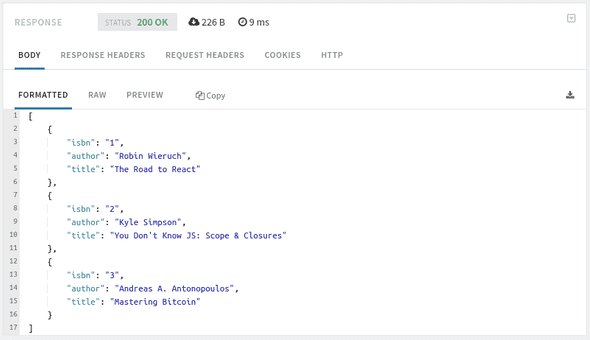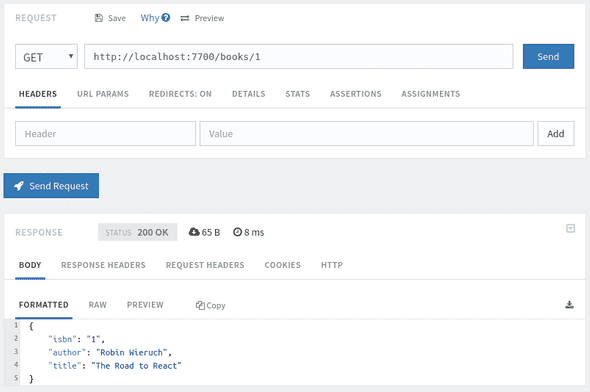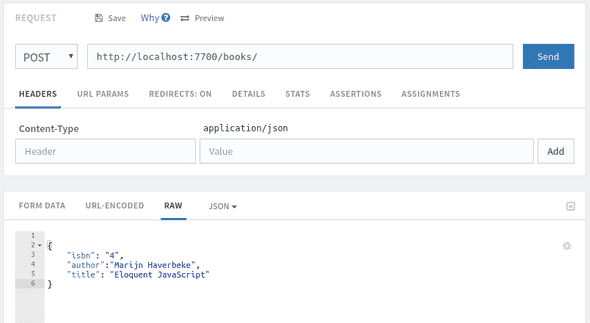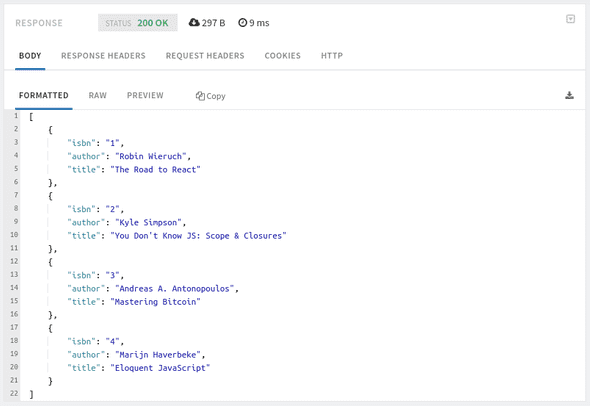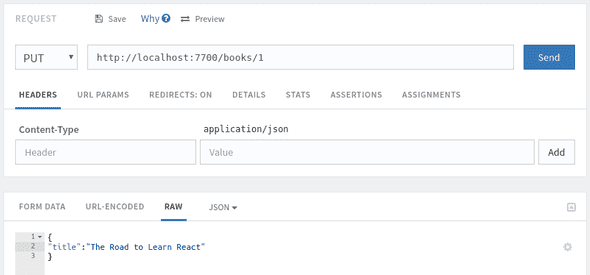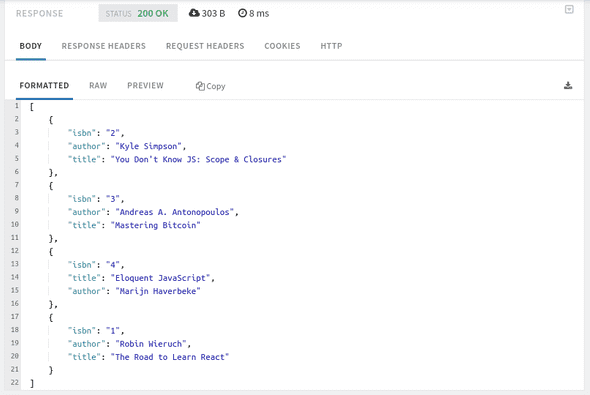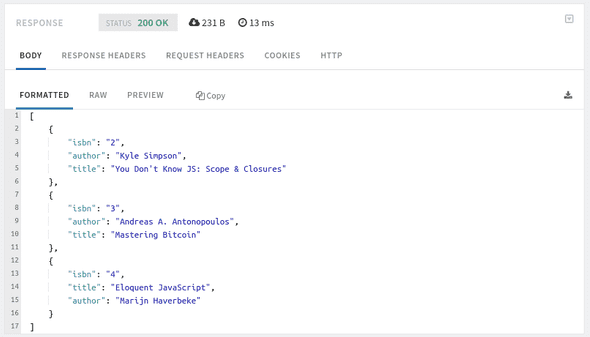Simple Rest API With Deno
May 14, 2020
Deno v1.0
After 2 years of its first release, Deno v1.0 is finally here.
So, what is Deno anyway ?
Deno is a simple, modern and secure runtime for JavaScript and TypeScript that uses V8 and is built in Rust. Deno’s official website
Ryan Dahl the original creator of Node.js (the popular server-side JavaScript runtime) announced Deno at JSConf EU 2018 on is his talk titled “10 Things I Regret About Node.js” ( From the title you can see where are we heading to ). In another word, if you are familiar with Node.js then Deno is just like that. Except that it’s improved in many ways, it’s created from bottom to top to be a better implementation of Node.js.
Simple comparison with Node.js
Since Deno and Node.js serve the same purpose, it’s possible to compare the two directly.
| Node | Deno | |
|---|---|---|
| Engine | V8 | V8 |
| Written in | C++ & JavaScript | Rust & Typescript |
| Package managing | package managers: npm | uses URLs |
| Importing pacakges | CommonJS syntax | ES Modules |
| Security | full access | permissioned access |
| TypeScript support | not built in | built in |
A Deno tutorial
Let’s play a little bit with Deno.
Deno’s Installation
To install Deno just copy and paste this command line in your terminal.
curl -fsSL https://deno.land/x/install/install.sh | shFor more details check Deno’s official installation guide.
When it’s done, you will have access to the deno command.
You can run deno --help to get the list of the options and subcommands provided by Deno, and you can run deno <subcommand> --help to get additional informations specific the subcommand for example: deno run --help
Now you can run deno or deno repl to open the REPL (Read-Execute-Print-Loop) and start typing some Javascript
$ deno repl
Deno 1.0.0
exit using ctrl+d or close()
> console.log("Hello World !")
Hello World !For the mean time (depending on when you’re reading this) on May 14 2020 the REPL supports only Javascript:
There are many things we can do to improve the REPL without introducing the TS compiler. We should do those things first (e.g. improve inspect, tab completion). Once we’re on par with Node’s REPL, we can start looking into how to go beyond that by using typescript. Ryan Dahl’s comment on TypeScript support in REPL
Run a Deno app
Use deno run <entry-point> command to launch a Deno app.
The entry point can be .js file, .ts file or even a URL that points to an app entry point and Deno will download, compile and then run it for you:
for example: s
$ deno run https://deno.land/std/examples/welcome.ts
Download https://deno.land/std/examples/welcome.ts
Compile https://deno.land/std/examples/welcome.ts
Welcome to Deno 🦕If you run the program again, it gets compiled directly it does not need to be downloaded again, it’s now cached by Deno:
$ deno run https://deno.land/std/examples/welcome.ts
Compile https://deno.land/std/examples/welcome.ts
Welcome to Deno 🦕You can force a reload of the original source with the --reload flag
deno run --reload https://deno.land/std/examples/welcome.tsAnd If you open the https://deno.land/std/examples/welcome.ts URL with the browser, you’ll get the page that contains the code and it’s documentation.
The Deno website provides other examples in the examples page.
Let’s build a simple REST API
We are going to use oak framework and Typescript (you can also use Javascript if you want to)
Let’s start by creating an app.ts file and import the Application and server from https://deno.land/x/oak/mod.ts
import { Application } from 'https://deno.land/x/oak/mod.ts'then we need to set the environment variables HOST and PORT
const env = Deno.env.toObject()
const HOST = env.HOST || '127.0.0.1'
const PORT = env.PORT || 7700Now create the routes.ts file import Router from https://deno.land/x/oak/mod.ts and create the routes.
import { Router }from 'https://deno.land/x/oak/mod.ts'
import { getBooks, getBook, addBook, updateBook, deleteBook } from './controller.ts'
const router = new Router()
router.get('/books', getBooks)
.get('/books/:isbn', getBook)
.post('/books', addBook)
.put('/books/:isbn', updateBook)
.delete('/books/:isbn', deleteBook)
export default routerNOTE: the functions getBooks, getBook, addBook, updateBook and deleteBook are imported from a local file, it’s just we haven’t created them yet.
Let’s create the controller.ts file and define an interface for a book IBook, then we declare an initial array of book objects:
interface IBook {
isbn: string;
author: string;
title: string;
}
let books: Array<IBook> = [{
isbn: "1",
author: "Robin Wieruch",
title: "The Road to React",
},{
isbn: "2",
author: "Kyle Simpson",
title: "You Don't Know JS: Scope & Closures",
},{
isbn: "3",
author: "Andreas A. Antonopoulos",
title: "Mastering Bitcoin",
}]Now let’s implement the functions one by one
getBooks: returns all the books on the list.
const getBooks = ({ response }: { response: any }) => {
response.body = books
}getBook: returns a single book by its isbn, or error message if not found.
const getBook = ({ params, response }: { params: { isbn: string }; response: any }) => {
const book: IBook | undefined = searchBookByIsbn(params.isbn)
if (book) {
response.status = 200
response.body = books[0]
} else {
response.status = 404
response.body = { message: `Book not found.` }
}
}addBook: add a book to the books list.
const addBook = async ({ request, response }: { request: any; response: any }) => {
const body = await request.body()
const book: IBook = body.value
books.push(book)
response.body = { message: 'OK' }
response.status = 200
}updateBook: updates a book if exists, return error message if not.
const updateBook = async ({ params, request, response }: { params: { isbn: string }; request: any; response: any }) => {
let book: IBook | undefined = searchBookByIsbn(params.isbn)
if (book) {
const body = await request.body()
const updateInfos: { author?: string; title?: string } = body.value
book = { ...book, ...updateInfos}
books = [...books.filter(book => book.isbn !== params.isbn), book]
response.status = 200
response.body = { message: 'OK' }
} else {
response.status = 404
response.body = { message: `Book not found` }
}
}deleteBook: deletes a book from the books list.
const deleteBook = ({ params, response }: { params: { isbn: string }; response: any }) => {
books = books.filter(book => book.isbn !== params.isbn)
response.body = { message: 'OK' }
response.status = 200
}Here is the source code on github
You want more of Deno ?
Here is some resources: Deno’s official website, The API documentation and you can find a lot more resources, libraries and frameworks in the Deno’s awesome list.
